There was a point in the not-so-distant past when Meghan Young and Sebastian Schuck thought they would never again work in the restaurant industry, which had brought them together. The fact that Meghan baked for friends during the pandemic and wished them well with a note that accompanied the treat, opened the door to another way forward.

On the menu (clockwise from top): a classic Pecan pie, a Brown Butter Honey Sea Salt pie and a Burnt Honey Squash (think pumpkin) pie topped with artfully toasted meringue.
Passionate about baking and experimenting with ingredients and ethnic foods, coupled with a desire to be challenged by recipes, Meghan set out to earn her associate degree in baking and pastry arts from The Restaurant School at Walnut Hill College in Philadelphia. Upon graduating, she worked at restaurants, cafés and bakeries in the city where, atypically, she embraced a combination of front and back-of-house roles.
In the fall of 2019, Meghan returned to her hometown of Lancaster to enroll at Millersville University. Working as a server in a local restaurant, she met Sebastian, a bartender with a specialty in all-things coffee.
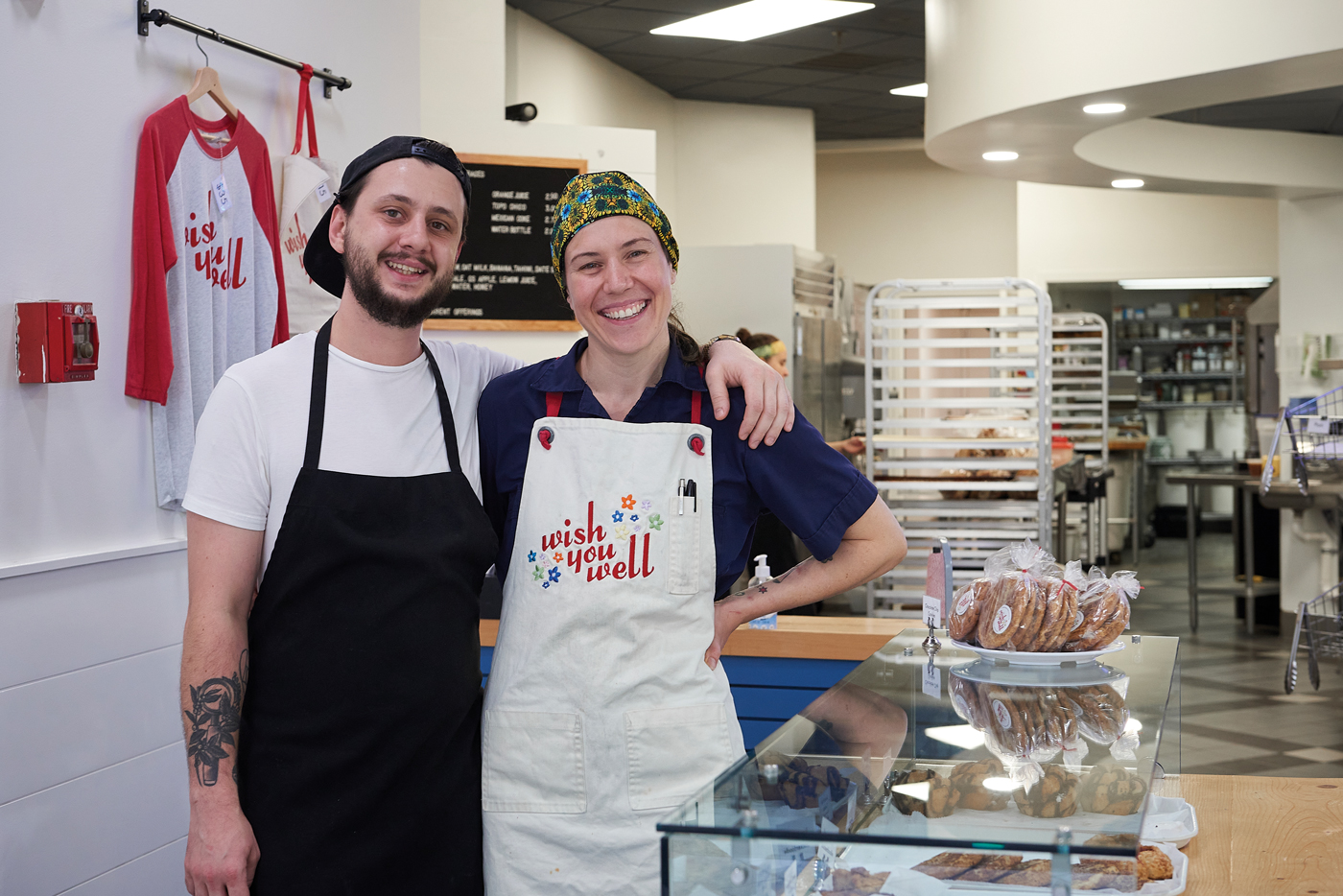
Wish You Well co-owners, Sebastian Schuck and Meghan Young, met through working at a local restaurant. Baking for friends during pandemic-related shutdowns convinced Meghan that opening their own bakery would allow them to operate a business on their own terms.
Pre-pandemic, the two were aware of how challenging the restaurant industry can be, but came to experience its full fragility at the height of Covid. Unsure of what to do next, Meghan embraced the idea of opening a bakery. She was confident that together, she and Sebastian would be successful.
Wish You Well
In June 2021, Meghan and Sebastian opened Wish You Well Bakery in the North Queen Street space previously occupied by Harvest Moon Bagel Co. The bakery’s name relates to a phrase that became Meghan’s “calling card” during Covid-related shutdowns. When she provided friends with baked goods, Meghan always included a notecard that closed with the salutation, “Wish you well.” Styled as more than a traditional bakery, Wish You Well also offers breakfast and lunch items for customers who are on the go.
With an affinity for exploring food from other cultures, some of the finds are welcomed additions, including a decadent chocolate babka made with yeast-risen sweet dough, spiced-chocolate filling, cookie crumbs and an orange-sumac glaze. Something as simple as chewy brown-butter snickerdoodles topped with cardamom cinnamon-sugar is transcendent.
Bagels made in-house from scratch are a true labor of love. They’re used in a signature sandwich – the Ruth Bagel Ginsburg – that serves as a nod towards equal pay (plus, Meghan’s middle name happens to be Ruth). It’s composed of smoked salmon, cream cheese, local mixed greens dressed with house-made lemon vinaigrette, pickled red onion, cucumber and capers. The late Supreme Court justice would be proud.
Rich, Flaky Pies
You could say that Thanksgiving is Meghan’s time to really shine. She describes the process of baking pies as being nostalgic, sharing that she started helping her mother bake pies for family holiday gatherings when she was a toddler. “Of course, in those days we never made pie crust from scratch,” Meghan remarks. “When I was old enough to follow recipes, I started making crust from scratch. Learning how to properly work with pie dough in culinary school was a game-changer,” she says.
Learning to scale, Meghan ran the pastry department for Urban Outfitters Headquarters at the Navy Yard in Philadelphia, directing the production of over 600 Thanksgiving pies in 2017. Now developing recipes for Wish You Well, she describes the magic ingredients behind her beautiful and tasty creations. “I use three different types of flour, including whole wheat, to achieve the desired texture and flavor,” says Meghan. “All butter, no shortening.”
As for crowd pleasers, she reports that “customers go crazy for the Salted Brown Butter Honey pie, but we’ve sold more Pumpkin [Burnt Honey Squash] than anything else. My favorite is Pecan; it’s the first pie I ever made entirely from scratch for my family, and I’ve made it every year since 2004!”
The Cost of Local
When it comes to sourcing ingredients, Meghan likes to shop at local farms, markets and producers on her days off. However, she is not always guaranteed to find local sources for items such as conventional eggs and butter and must rely on other purveyors. While the quality of those ingredients is high, so, too, are their costs, which skyrocketed during the pandemic and have remained so in these inflationary times.
Comparing invoices from the same provider from over the course of the last two years provides insight. In November 2020, for example, 15 dozen conventional large white eggs (used for baking) cost $24. In September 2022, the cost had risen to $46.05. Over that same time period, 36 pounds of unsalted butter doubled in price, increasing from $71.64 to $146.88.
Local products produced on smaller scales are even more costly. For example, 15 dozen pastured eggs (used as an ingredient in sandwiches) from a local supplier now cost $56. Fifty pounds of all-purpose butter from another supplier cost $17.39, versus $45.18 for a locally produced product.
No Tipping, Please
One key difference at Wish You Well is that tips are neither requested nor accepted. While it might seem strange to attempt to offer money to a business and have them decline, there’s considerable experience behind the decision. “If a restaurant is asking for tips it’s because their employees are counting on that as part of their pay,” says Meghan. Customers, however, “think it’s extra,” she says. Instead, starting pay at Wish You Well is $15 per hour.
“I worked at [a local café] managing a coffee program; my tips in an average week would be $20,” says Sebastian of the practice that saw tips pooled and split evenly among baristas each week.
“I also don’t think it should be the responsibility of the guest to decide what the worker should earn,” Meghan elaborates. “Since we’re not a full-service restaurant, we would [only] have to pay regular minimum wage [$7.25]… but we could still pay less than we are. I know that if we took that approach, the tips we would draw in probably would not bring our team up to $15 an hour.”

Meghan has been making her signature Pecan pie for nearly 20 years. Her interest in baking was sparked by helping her mother prepare pies for her family’s holiday dinners.
The minimum wage in Pennsylvania for tipped workers – enacted into law in 1977 – is still set at $2.83 an hour. According to the U.S. Census Bureau, the real median household income that year was $13,570. In 2021, that figure was $70,784, more than a five-fold increase.
“I want to set an example for the industry,” says Meghan. “I want to show other small food-business owners that we can make a change; there’s no reason why our industry should operate in this way,” she says. “A lot of establishments have tried this in the past and haven’t lasted. It’s something I know is going to become a difficult adjustment if it ever goes industry-wide, but if we can be one small part of that change, to me, that means something.”
Indeed, restaurant patrons are starting to question the upcharges, service charges and the tip options that now appear on receipts, especially in the case of take-out. Journalist Michelle Singletary (The Washington Post, September 16, 2022) addressed the growing controversy; the article prompted hundreds of responses, with many voicing their displeasure over the cashless payment systems that default to including a tip – for take-out – that ranges from 15% to 25% on average. (One person shared they now make it a practice to pay for take-out with cash and thus avoids the pressure to mark one of the percentage boxes and instead tips as they see fit.)
Still others questioned why a person who simply hands you a bag should earn a tip. Some felt it was fine to tip for take-out if it is being shared with the kitchen staff or if the order included special requests and substitutes. Some shared that they were confused by the double whammy of the cashless option coupled with a “tip jar.”
There’s also a new wrinkle. Per the October issue of Washingtonian magazine, restaurants in larger cities are replacing the word “tip” on the automated receipts with “service charge.” The service fees are being used for any number of purposes including tip pools, rainy day funds, health insurance … In such cases, tipping individual servers is also acceptable, again leading to confusion for guests.
On the other end of the spectrum, responders said they commiserate with the low wages that restaurant industry workers earn and are happy to tip them. Some went so far as to say if you can’t afford that extra 15% (or more) for the convenience of take-out, perhaps you should stay home and cook for yourself.
Regardless of where they stood, a majority held the opinion that if tipping is to continue, it’s time to return to the pre-pandemic practice – notably in the case of restaurants – of rewarding a server for excellent service and not feeling pressured to provide a tip that is not warranted. Quite a few said they would be comfortable with higher-priced menus – in order to provide employees with a living wage – and eliminate tipping altogether. Many pointed out that tipping is not a custom in many European countries and reported that service is on par or exceeds that of American restaurants.
“For us, a fast-casual food service and retail bakery, a lot of people wouldn’t think about tipping 20% in the first place,” says Meghan. “It doesn’t bridge the gap. Restaurant owners benefit from this system – they only have to shell out $2.83 an hour for [tipped] employees, and they’re relying on customers to pay the rest of their wages. I don’t think that’s fair. It’s contributed to the unsustainable, unhealthy environments in restaurants. It’s contributed to the exodus of restaurant workers changing careers because the pandemic gave us a chance to step back and say, ‘Wow, I don’t know why I put myself through that.’ If we didn’t have the bakery, I don’t know that either of us would be working in the industry anymore,” says Meghan. “No,” says Sebastian in quick agreement.
Fair Pay
Many restaurants have taken various approaches to pay staff equitably, including adding a percentage charge to checks, which is earmarked for back-of-house staff, like chefs, managers or expeditors, line cooks and dishwashers. Front-of-house staff, such as hosts, servers and bartenders, usually work for tips.
Meghan and Sebastian, have worked on both sides of the equation. “It’s not as common to be drawn to both aspects of it,” says Meghan. Pivoting between the two positions became a balancing act of managing social energy in the front of the house or the pressures related to the back-of-house. Each came with different methods of earning income, which in itself could require a role change to make ends meet. “We’ve seen both sides. We know that there’s a pay disparity between the front and back-of-house,” she remarks. “Towards the end of working for other people, I was drawn to environments where I could still bake and interact with guests. I get stimulated by those interactions.”
“We’ve created this romantic idea of what it’s like to work in a restaurant kitchen, that it’s okay to keep treating people this way because everyone’s been through it and this is how you earn your opportunities,” says Meghan. “I remember my first job out of pastry school – it was awesome to get hired out of pastry school,” she says of working for a restaurant in Philadelphia. “But, it wasn’t awesome to realize I got hired part-time for 40 hours a week at $12 an hour; then they offered me the opportunity to become full-time, 60 hours a week, for a salary of $27,000 a year, which worked out to minimum wage, plus the overtime hours I was working.”
“After five months, I could not afford to work there,” she continues. “I couldn’t pay my bills, my bank account was empty. I had to quit.” Looking back, she calls her tenure there as, “The most enriching experience I’ve ever had in a kitchen, and I hated to leave it. I loved what I was learning. I was working with people who inspired me, who were getting recognition on a national level. I got to bake things that were photographed for magazines, but I felt taken advantage of and it was something I couldn’t continue [doing].”
Fortunately, Meghan and Sebastian found another way forward, together. As a bonus, she is still baking delicious pies that are being photographed for a magazine.
Wish You Well is located at 47 N. Queen St. in Lancaster. Hours are Thursday through Monday, 8 a.m.-2 p.m. Pie orders are accepted online. For more information, visit wishyouwellbakery.com.





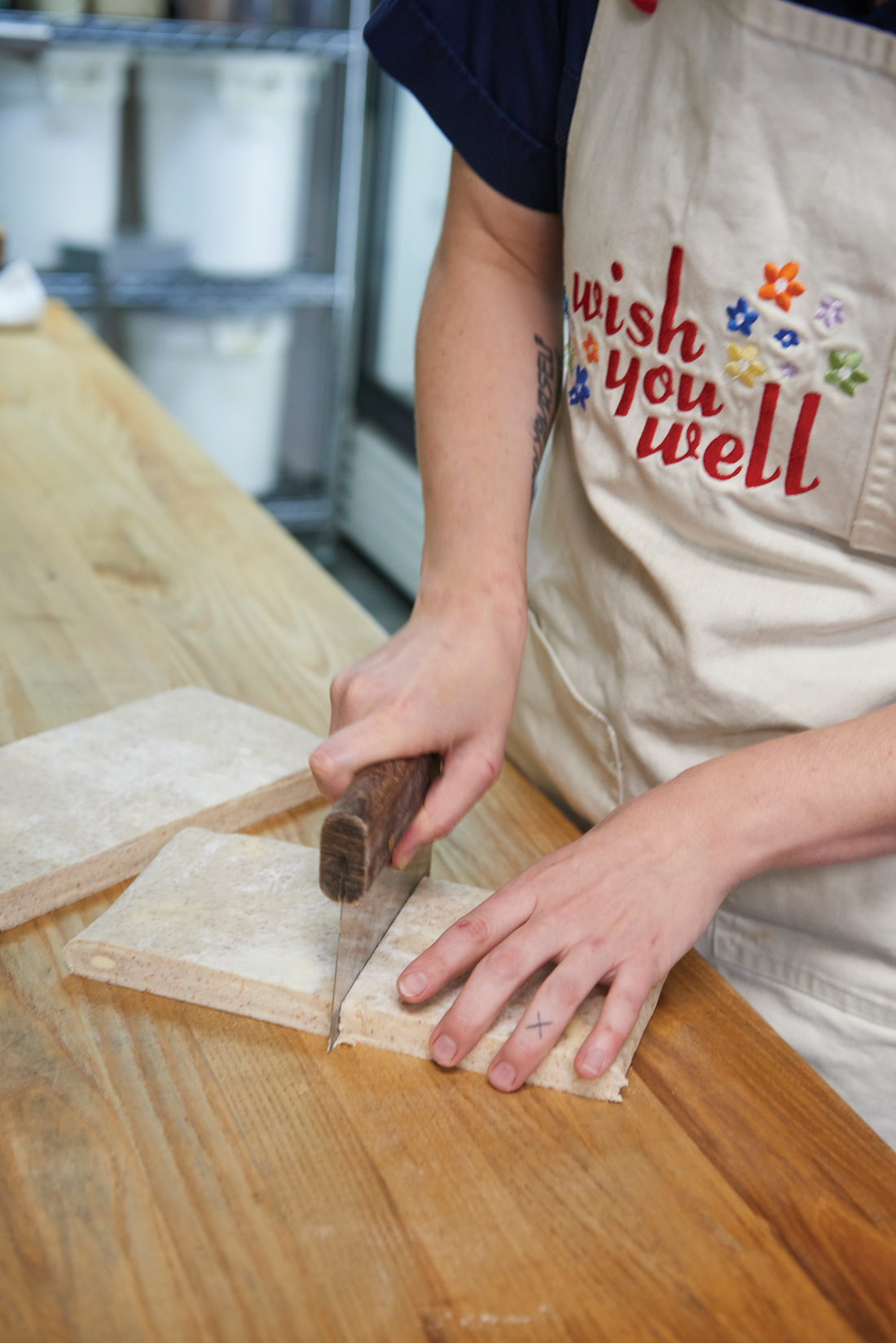
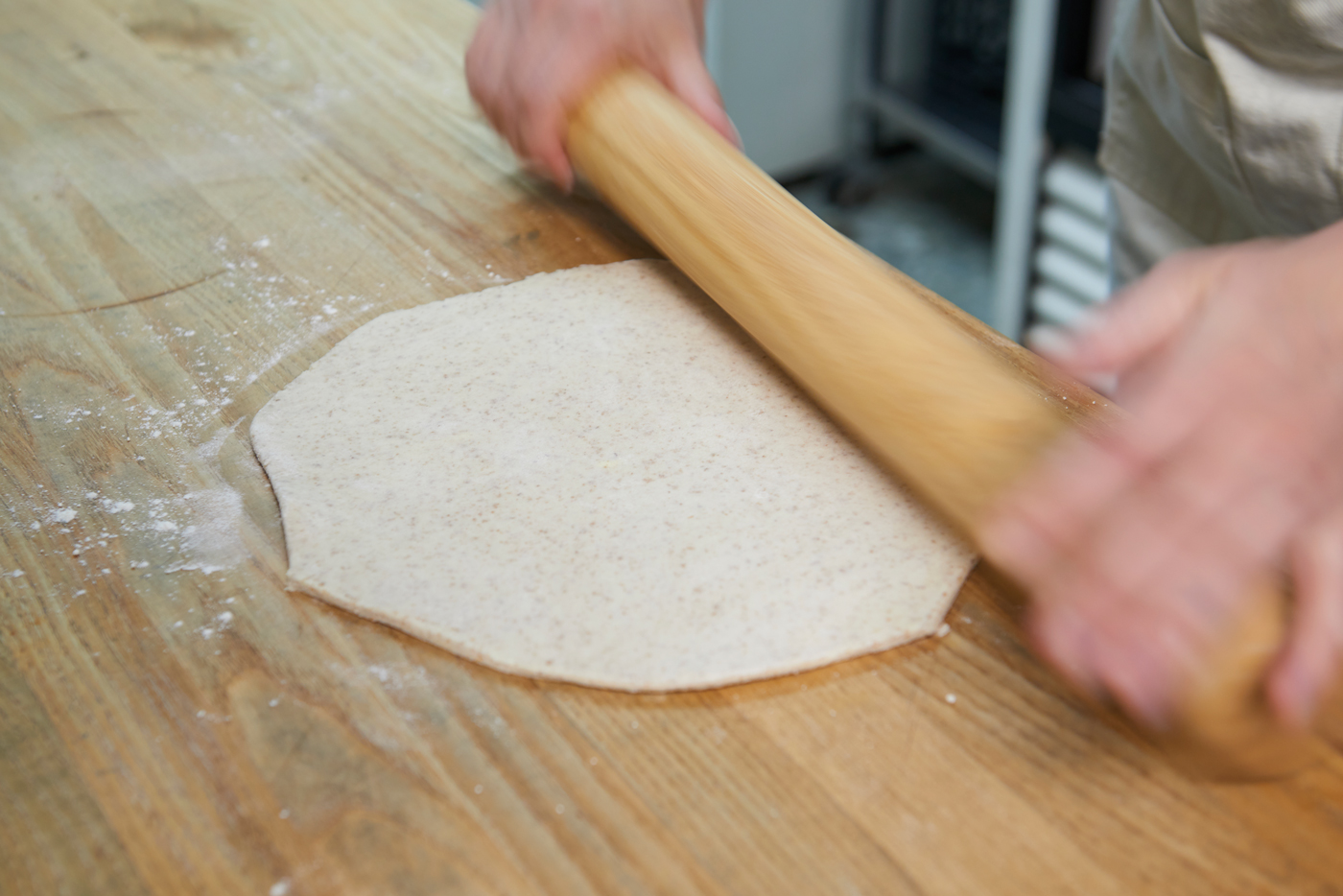
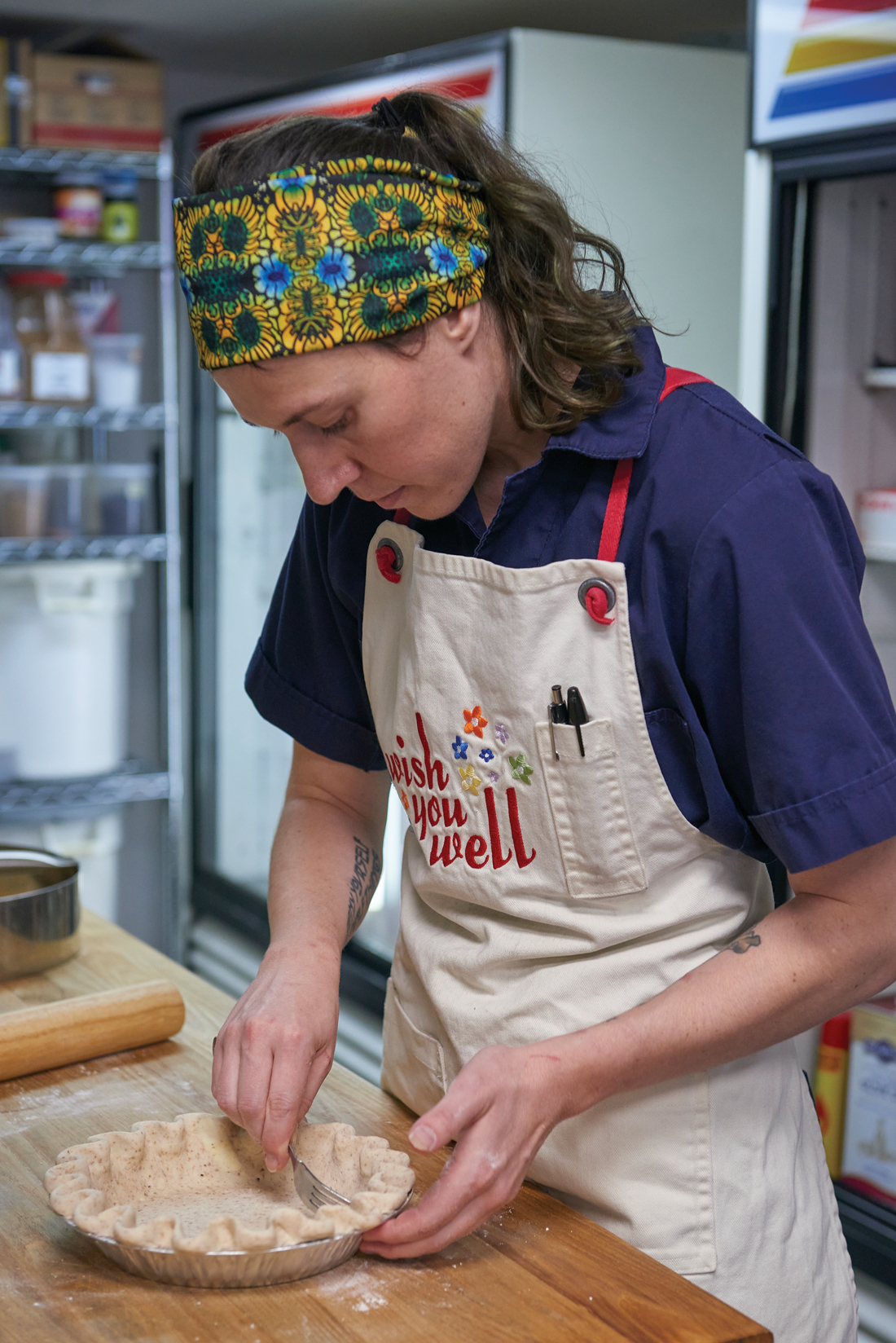
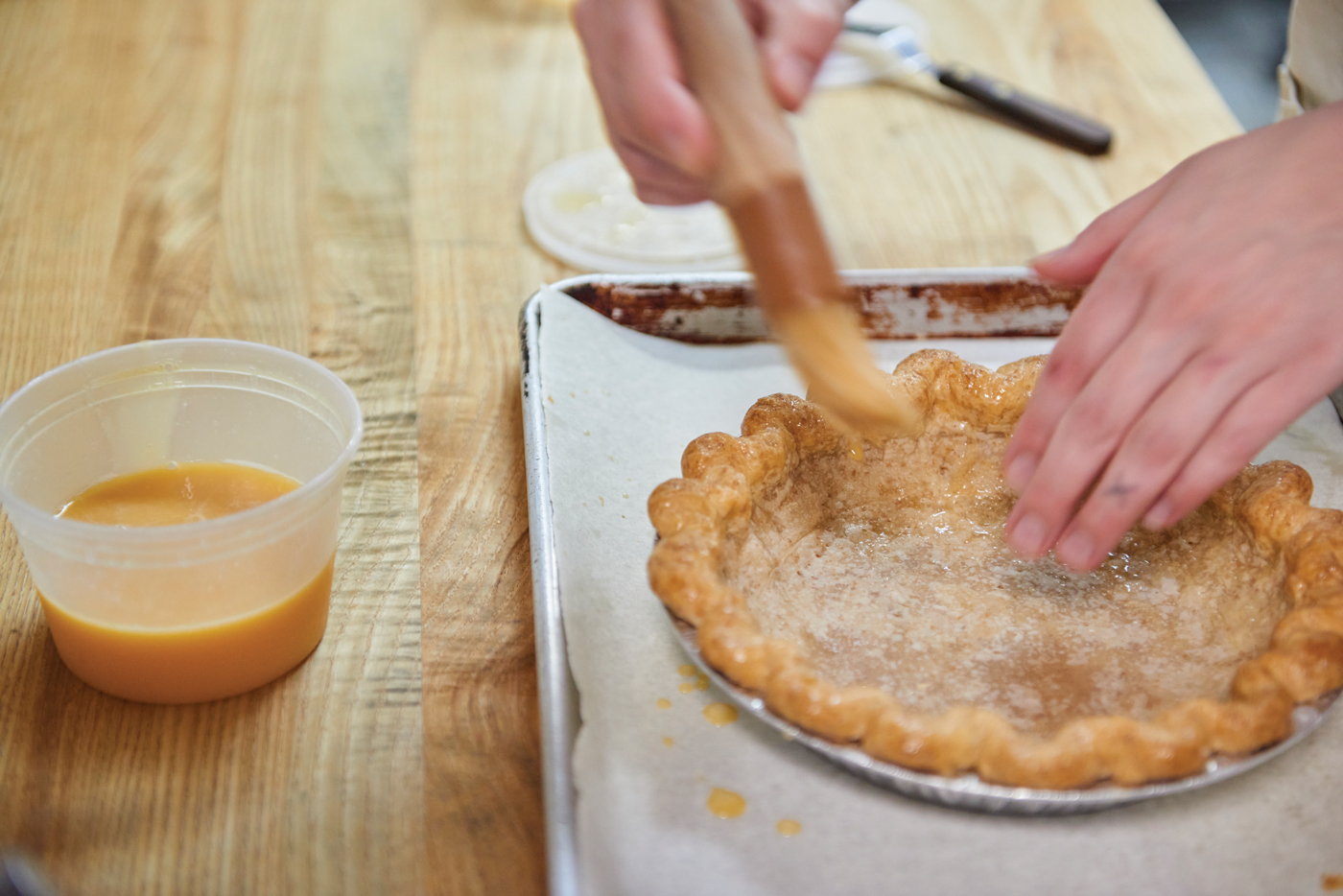
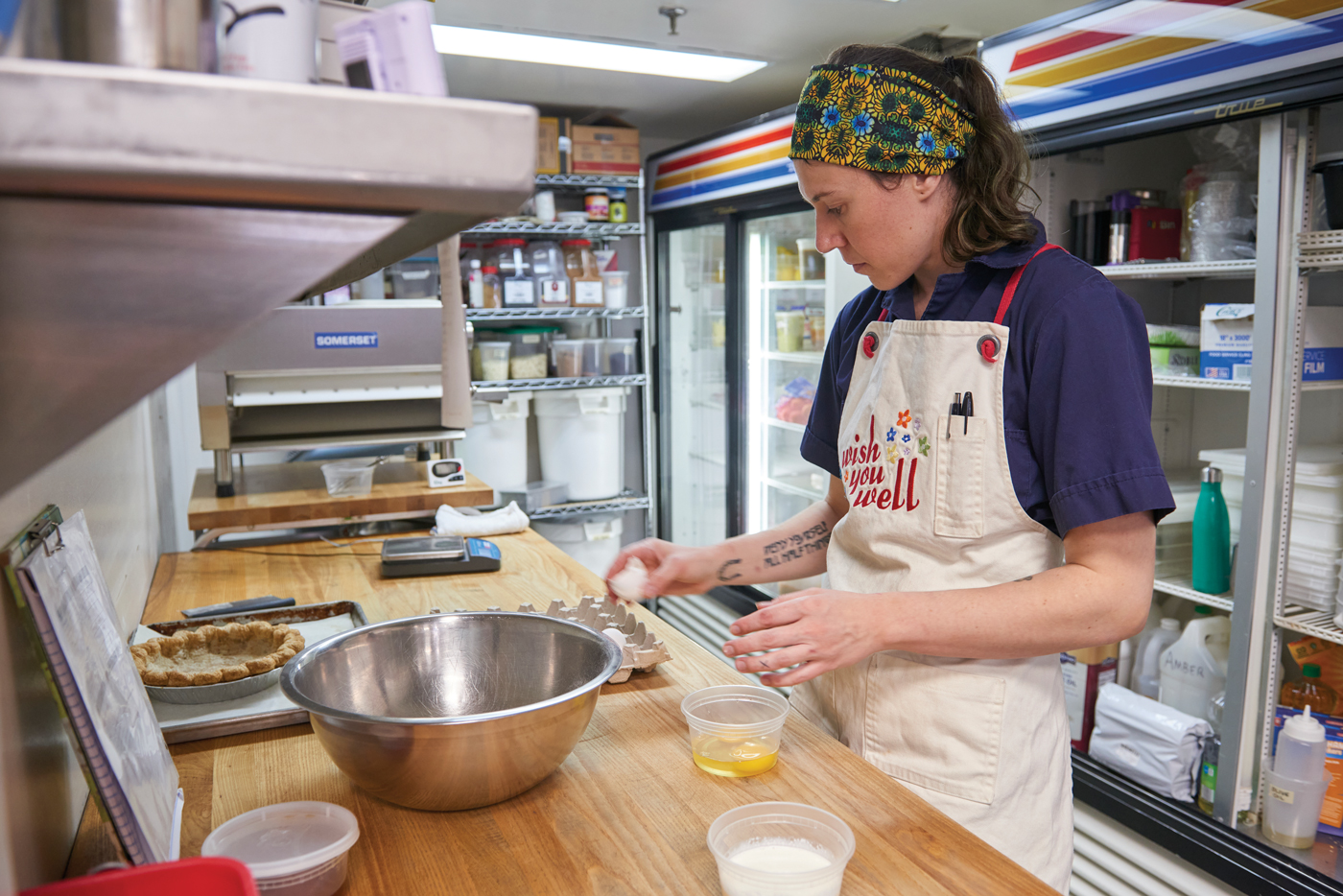
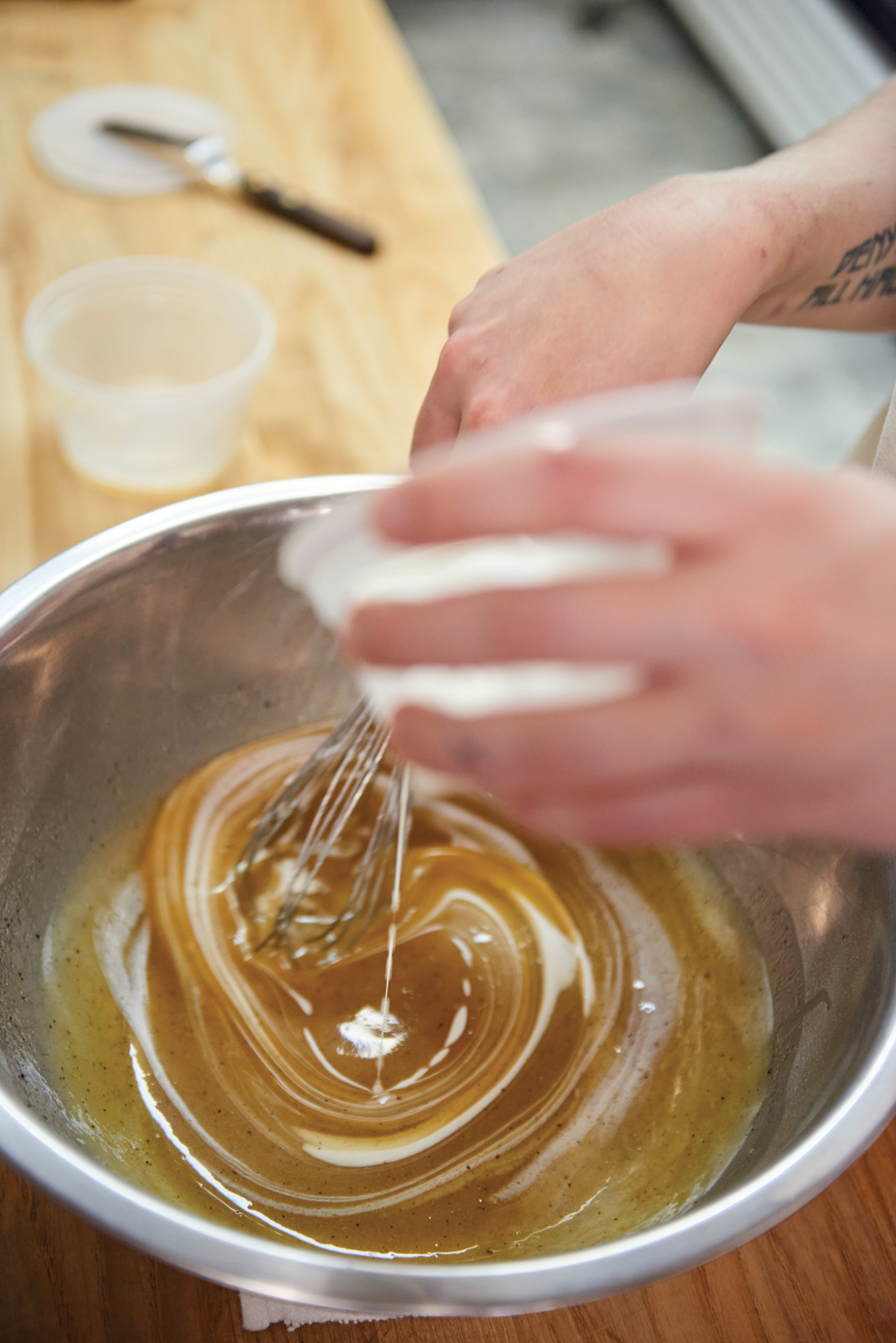

Meghan and Sebastian do a wonderful job. They are very hard working. I have never had anything that wasn’t absolutely delicious. I live in Northern Kentucky and visit their bakery every time I get to Lancaster. The cookies are the best!!